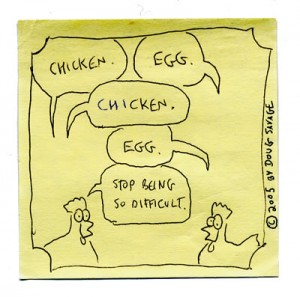Can you imagine toilet paper being the root cause of someone’s murder? Well, structurally, I can.
 In my workshops and keynotes, I bring up the age-old debate on whether toilet paper should roll off the top of the roll or the bottom. My research shows that about 5% of the population is rigidly certain (from their Knower/Judger, of course) that the only proper way toilet paper should come off a roll is off the bottom. The other 95% is convinced (from their K/J) that God meant it to roll off the top. It can be quite amusing when two combatants start debating this in a workshop—and quite difficult to get them back on track.
In my workshops and keynotes, I bring up the age-old debate on whether toilet paper should roll off the top of the roll or the bottom. My research shows that about 5% of the population is rigidly certain (from their Knower/Judger, of course) that the only proper way toilet paper should come off a roll is off the bottom. The other 95% is convinced (from their K/J) that God meant it to roll off the top. It can be quite amusing when two combatants start debating this in a workshop—and quite difficult to get them back on track.
I use the example to get people to feel just how concrete some of our rules of life, no matter how trivial, can be.
I then go on to point out that, structurally, there is no difference between the under-the-roll toilet paper tyrant and the radical Muslim father who straps C4 explosives to his 14-year-old daughter’s torso and sends her into a marketplace filled with western tourists.
Both of their K/Js know right from wrong.
It seems that until somebody gives up his or her God-given duty to be right, even the most inconsequential disconnect between two people’s K/J understanding of right and wrong will inevitably lead to someone’s demise. Sounds ridiculous, doesn’t it? But in any discourse I’ve ever witnessed, if one combatant or the other doesn’t stop defending her position, the rant will just escalate. And it will continue to escalate until one person stops or violence occurs. And even then, one person will have to stop or possibly die.
Let’s look at some murderous rant subjects:
- Religion
- Race
- Nationality
- Possessions
- Jealousy
- Governance
- Money
- Sex
- Toilet paper (just kidding)
I believe you will identify that you have a strong K/J understanding of right and wrong on just about all of those subjects. Your neighbor, co-worker, or brother probably doesn’t share your exact understanding. Can you foresee one of you killing the other? I seriously doubt it. But eventually one of you will functionally back down… or agree to disagree… or in some way pour cold water on the rant, because eventually you come to understand there’s nothing to be gained by establishing your unique claim to being right.
Can you estimate the billions of dollars of productive time wasted in business and governance by people whose egos just have to be right? They verbally and psychologically beat on and punish one another in the hopes that the other guy backs down. The delay in action has cost our society resources, money, and lives.
The sad thing is that enemy-ness is a temporary state. Look at history and you will see many examples of former enemies becoming allies.
- Germany and Japan were enemies of the United States. After WWII, they became trading partners and allies.
- Johnny, who got into the “Did so!”, “Did not”, “Did so”, “Did not” debate on the playground with you in fourth grade was the best man at your wedding.
- F.W. De Klerk, who condoned jailing Nelson Mandela for 27 years (because De Klerk knew he and his party were right), turned his back on decades of racism long enough to serve the “big picture” of South Africa. De Klerk and Mandela shared the Nobel Peace prize in 1993. Hear it in DeKlerk’s own words.
As we celebrate (celebrate?) the 150th anniversary of the first shots fired in the American Civil War—an unchecked K/J vs. K/J rant that claimed over 600,000 lives—I would like you to pause.
Next time you find yourself defending how the toilet paper comes off the roll or some policy issue at your company, customer service complaint, political opinion, or religious imperative, experiment with acknowledging the possible validity of the other side. Acknowledge that your adversary may have a point.
How can he fight that? How can he push back? You’ve taken away his reason to rant. The temporary state of enemy-ness is not inevitable. You don’t have to defend your position. You don’t have to be nor have an enemy… even a temporary one. History has shown us the data that progress is only possible when the rant is over… or never begun.


